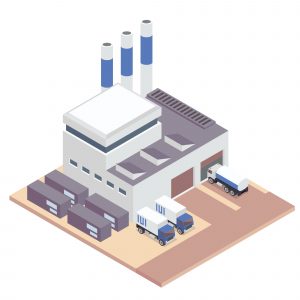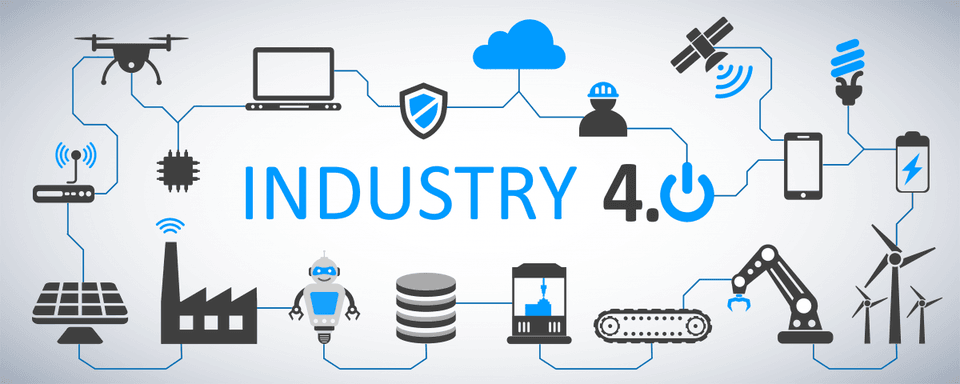INDUSTRY 4.0
It's not a revolution, it's an evolution!
SHORT HISTORY
Industry 1.0 (1760-1840) refers to the first industrial revolution.
During this period, manufacturing has evolved from focusing on manual labor, performed by humans, to a more optimized form of work performed by humans through the use of water, steam engines and other types of machine tools.
Industry 2.0 (1870-1914) is the second industrial revolution or better known as the technological revolution.
It was made possible by the extensive rail networks and the telegraph that allowed the faster transfer of people and ideas. It is also marked by the increasingly present electricity, which allowed the electrification of the factory and the modern production line.
Industry 3.0 took place at the end of the 20th century under the name of the digital revolution. It was a huge breakthrough, before which the advent of computers and automation led the industrial scene.
Industry 4.0 vs The forth Industrial Revolution
The 4th industrial revolution
The phrase "The Fourth Industrial Revolution" was first introduced by Klaus Schwab (Executive Chairman of the World Economic Forum) in 2015 in an article in Foreign Affairs.
The term represents the fourth major industrial era since the original Industrial Revolution of the 18th century. And it is characterized by a fusion of technologies that blur the lines between the physical, digital and biological spheres.
Industry 4.0
The term Industry 4.0 first appeared in 2011, through a strategic initiative of the German government. The aim of the initiative is to transform industrial production by digitizing and exploiting the potential of new technologies.
In April 2013, the term "Industry 4.0" reappeared at an industrial fair in Hanover, Germany, and quickly became Germany's national strategy.
Industry 4.0 describes the tendency for automation and data exchange in technologies and manufacturing processes that include cyber-physical systems (CPS), the Internet of Things (IoT), the Industrial Internet of Things (IIOT), cloud computing, cognitive computing and artificial intelligence.
There is a difference between the two expressions, they overlap only partially.
Concept versus Strategy
The Fourth Industrial Revolution is a concept with its own technical standards, which everyone should follow.
Industry 4.0 is a strategy to improve the technology, created by Europeans according to the standards of the Fourth Industrial Revolution.
Industry 4.0 is a strategic and intentional approach to shaping the future, while accessing an industrial revolution helps us understand what has already changed and what are the trends in industrial change.
By being actively involved in shaping the future, adopting a global strategy, we will be able to respond better to change.

Industry 4.0: Benefits
+ Improved efficiency
With fewer people and more automation, companies can make decisions faster and maintain a high degree of efficiency. Automation also tends to maintain high quality, and this is an area that further enhances efficiency.
+ Increased productivity
In simple terms, Industry 4.0 technologies allow you to do more with less. In other words, you can produce more and faster as you allocate your resources more cost-effectively and efficiently. Also, production lines will have less downtime due to improved automatic monitoring and automatic / semi-automatic decision making.
+ Flexibility and agility
The benefits of Industry 4.0 also include increased flexibility and agility. For example, it is easier to monitor production in a smart factory. It is also easier to introduce new products on the production line, as well as to create opportunities for a single manufacturing operation, a varied (mixed) production and many more.
Example: Compliance with regulations in industries such as the manufacture of pharmaceutical and medical devices should not be a manual process. Instead, Industry 4.0 technologies enable compliance automation, including monitoring and identification, quality inspections, distribution, data recording and more.
+ Reduces costs
A smart factory is not obtained overnight and by no means, on its own. To achieve this, you have to invest, so there are initial costs. However, the manufacturing cost of your installations will drop dramatically as a result of Industry 4.0 technologies, such as automation, system integration, data management and more.
+ A better customer experience
Industry 4.0 also offers opportunities to improve the services and experience you provide to your customers.
Forbes said, "The delivery phase is a critical aspect of the supply chain that can build or destroy customer experience. With the capabilities of Industry 4.0, organizations can simplify logistics and ensure better delivery experiences."
Difficult delivery times or custom orders can negatively affect the customer experience. Industry 4.0 can help you speed up deliveries and personalized options while reducing errors.
+ Obtaining a return on investments
The technology of Industry 4.0 transforms production around the world. The benefits of Industry 4.0 and the potential return on investment are really important. To stay competitive and equip your production lines for the future, it's time to think about the next leg of the Industry 4.0 journey.

Industry 4.0: Disadvantages
Along with the various advantages of Industry 4.0, there are also disadvantages to technology when implementing machine automation practices in your process.
- Limited creativity
The production technology completely limits creativity due to the abundance of automation / machines and the lack of employees within the production facility. Employees are able to think through controversies while counteracting a particular problem, while machines are optimized / set to perform exactly as they are required, despite any errors that may occur.
- Increased unemployment
Unemployment is a major concern for production since automation began to play a very important role. As manufacturing technologies have become predominant, there are many concerns about what human labor means in production companies.
- Contribution to environmental problems
Global warming is a major concern for many people around the world - production being a substantial contribution to this. With production technology that means more equipment and technologies being incorporated into production facilities, this means a greater environmental impact - mainly due to fuel sources, such as gases and chemicals.
- IOT security
The Internet of Things is a major concern. Companies are working to address security gaps.
- Technology implementation
Industry 4.0 requires considerable implementation time as well as efforts across the industry.
- They can't perform complicated tasks
Although the machines offer an increase in quality and redundancy, the current automation technology has failed to address the problem of complex production. People, at least at this time, are the only workers capable of performing customized or complex production tasks.
- High initial costs
While automatic cars will save you money in the long run, they require a significant upfront investment. As a business owner or manager, you will need to find a way to make this investment fit into your total budget.
- Requires maintenance and training
Your current employees will need to be trained to properly deploy, operate and maintain automated systems to ensure their continuous operation.
While Industry 4.0 is constantly evolving, we may not have a complete picture until we look back 30 years ago.
Even though many organizations may still be in denial about how Industry 4.0 could affect their business, other companies are already implementing changes and are preparing for a future where smart cars are improving their business.

